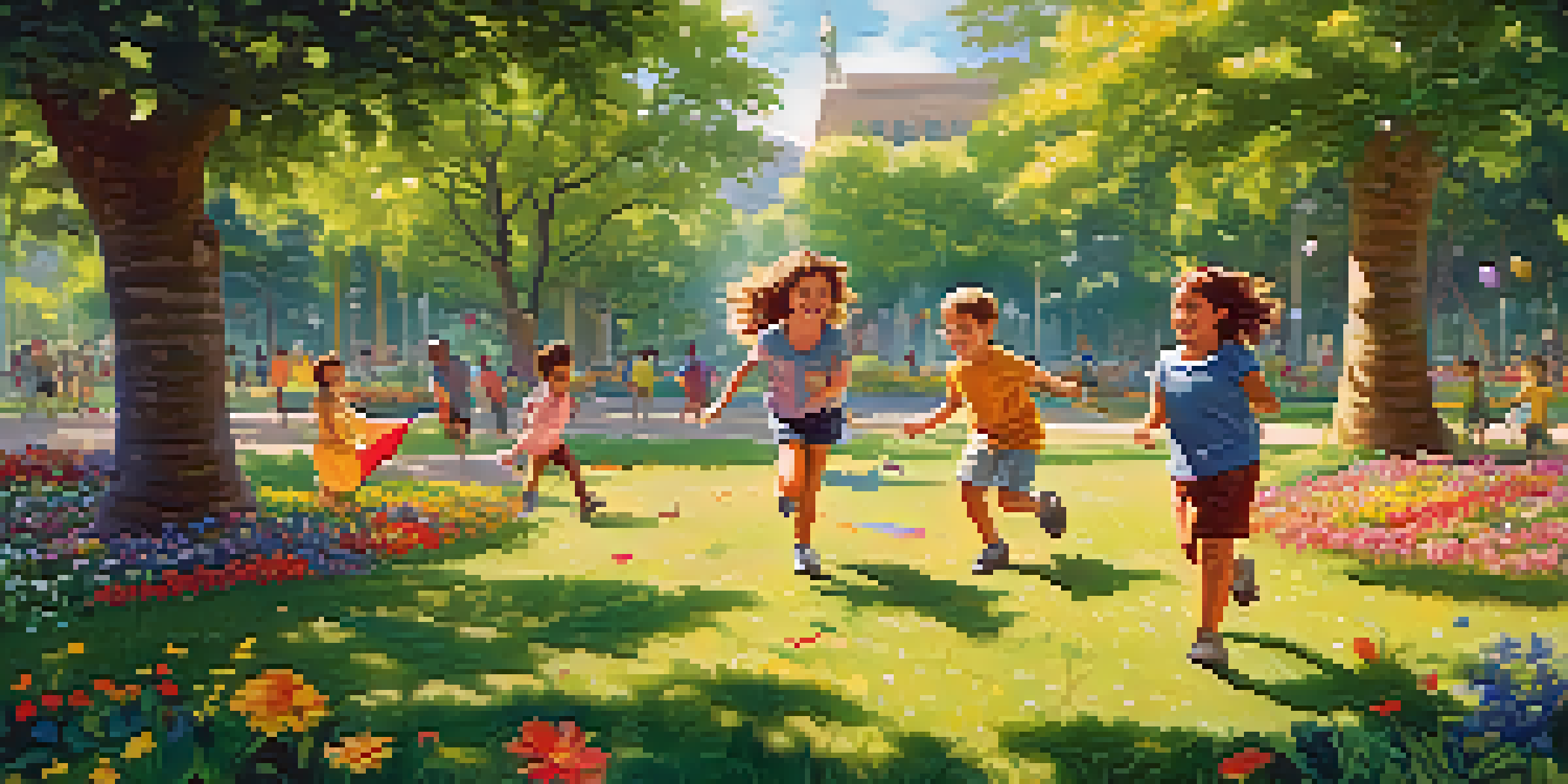Children's Films and Mental Health: Lessons for Young Minds

The Role of Storytelling in Children's Films
Storytelling is a powerful tool in children's films, captivating young audiences with engaging narratives. These stories often reflect the emotional journeys of characters, allowing kids to see themselves in various situations. For instance, films like 'Inside Out' delve into complex emotions, helping children understand their feelings better.
Stories can conquer fear, you know. They can make you feel less alone.
When children watch characters navigate challenges, it can foster empathy and resilience in them. They learn that it’s okay to feel sad, angry, or confused, which is a vital lesson in emotional intelligence. By seeing these emotions portrayed on screen, kids can begin to articulate their own feelings more clearly.
Moreover, storytelling encourages critical thinking and problem-solving skills. As children watch characters overcome obstacles, they are inspired to think about how they would react in similar situations. This not only enhances their cognitive development but also prepares them for real-life challenges.
Emotional Resilience Through Animated Characters
Animated characters often face trials that resonate with children's own experiences, such as friendship issues or family dynamics. These relatable scenarios can teach kids about emotional resilience, showing them that setbacks are a part of life. For example, in 'Finding Nemo,' the theme of perseverance shines through as Marlin learns to trust others and let go.

As children identify with these characters, they can internalize valuable lessons about facing fears and overcoming difficulties. This can help them develop coping strategies when they encounter challenges in their own lives. Seeing a beloved character triumph over adversity can instill a sense of hope and determination.
Storytelling Builds Emotional Skills
Children's films use storytelling to help kids understand and articulate their emotions, fostering empathy and resilience.
Additionally, these films often provide a safe space for kids to process their emotions. Watching characters navigate tough times can prompt discussions between children and caregivers, allowing for deeper understanding and emotional support. This connection can be instrumental in nurturing their mental health.
The Impact of Humor in Children's Films
Humor is a vital element in many children's films, serving as a tool for both entertainment and healing. Laughter can lighten the mood, making complex emotions more approachable for young viewers. For instance, movies like 'Toy Story' blend humor with heart, allowing kids to laugh while also engaging with deeper themes.
Children are made readers on the laps of their parents.
Humor not only entertains but also encourages a positive outlook on life. When children see characters using humor to cope with challenges, they learn that laughter can be a helpful response to stress. This can cultivate a more optimistic mindset, aiding in emotional resilience.
Moreover, humorous situations can spark conversations about difficult topics in a more digestible way. When kids laugh, they are often more open to discussing their feelings and fears. This dialogue can foster a supportive environment, essential for mental well-being.
Lessons on Friendship and Social Skills
Children's films frequently highlight the importance of friendship and teamwork, showcasing how relationships enrich our lives. Movies like 'Zootopia' emphasize collaboration and understanding, teaching kids valuable social skills. These themes can guide children in forming healthy relationships with their peers.
By watching characters navigate friendships, children learn about empathy, communication, and conflict resolution. They see how to handle disagreements and celebrate differences, which is crucial for their social development. These lessons can translate into their own interactions, helping them build stronger connections with others.
Humor Encourages Open Dialogue
Humor in children's films makes complex emotions approachable, promoting conversations about feelings and mental well-being.
Additionally, these films often illustrate the significance of inclusivity and acceptance. When children see diverse characters work together, it encourages them to embrace differences in their own lives. Such representation is vital for fostering a sense of belonging and self-acceptance.
Exploring Identity and Self-Discovery
Many children's films focus on themes of identity and self-discovery, allowing young viewers to explore who they are. Characters like Moana or Simba embark on journeys that mirror the search for one's purpose and place in the world. These narratives can resonate with children who are beginning to form their own identities.
As kids watch these characters grapple with questions about themselves, they are encouraged to reflect on their own feelings and aspirations. This can lead to greater self-awareness and confidence. Films that address personal growth can inspire children to embrace their uniqueness and pursue their passions.
Moreover, these stories often highlight the importance of staying true to oneself, even in the face of challenges. By witnessing characters overcome obstacles while remaining authentic, children learn the value of integrity and self-acceptance. This can have lasting effects on their mental health and self-esteem.
Understanding Grief and Loss Through Animation
Children's films often address themes of grief and loss in a sensitive manner, helping young viewers navigate these complex emotions. Movies like 'Up' illustrate the beauty of memories while acknowledging the pain of loss. These narratives can provide comfort to children experiencing similar feelings in real life.
By portraying grief in a relatable way, these films can demystify the concept and make it less frightening. Children learn that it’s normal to feel sad and that healing takes time. This understanding can be crucial in helping them process their own experiences of loss.
Friendship Teaches Social Skills
Through themes of friendship and teamwork, children's films guide kids in developing essential social skills and embracing diversity.
Furthermore, these films can serve as a catalyst for conversations about death and remembrance. Caregivers can use these stories to discuss feelings of grief and encourage children to express their emotions. This dialogue can foster emotional resilience and support mental health during difficult times.
Creating Safe Spaces for Emotional Expression
Children's films can create safe spaces for emotional expression, allowing kids to feel and share their emotions freely. By watching characters experience a range of feelings, children learn that it's okay to express themselves. This validation is crucial for their emotional development and mental health.
These films often encourage discussions about feelings, prompting children to articulate their own emotions. When caregivers engage with kids about what they're watching, it can strengthen their bond and provide a platform for open communication. This interaction is key to nurturing their emotional literacy.

In addition, creating a safe space through film can lead to greater empathy and understanding among peers. As children discuss what they’ve seen, they can practice kindness and support for one another. This sense of community is vital for promoting positive mental health in young minds.